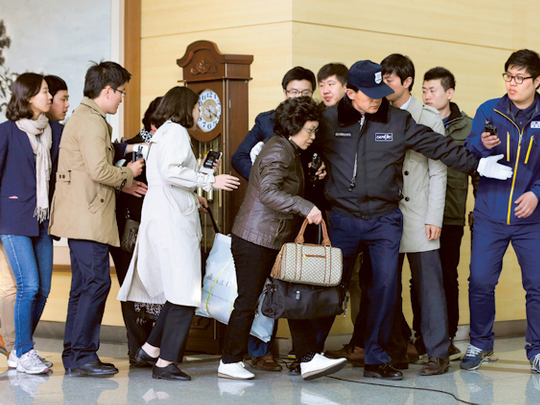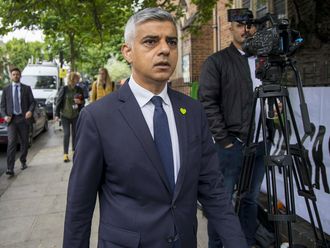
Seoul: North Korea said Tuesday the Korean peninsula was headed for “thermonuclear” war and advised foreigners in South Korea to consider evacuation - a warning that was largely greeted with indifference.
It followed a similar warning issued last week to foreign embassies in its capital Pyongyang to consider evacuating by April 10, with the North saying it could not ensure the safety of their personnel if conflict broke out.
“The situation on the Korean Peninsula is inching close to a thermonuclear war,” the North’s Asia-Pacific Peace Committee said in a statement carried by the North’s official Korean Central News Agency.
Saying it did not want to see foreigners in South Korea “fall victim”, the statement requested all foreign institutions, enterprises and tourists “to take measures for shelter and evacuation”.
The committee blamed the heightened war risk on the “warmongering US” and its South Korean “puppets” who were intent on invasion.
The “thermonuclear war” threat has been wielded several times in recent months - most recently on March 7 - despite expert opinion that North Korea is nowhere near developing such an advanced nuclear device.
“It is our current assessment that there is no immediate risk to British nationals in South Korea,” a British embassy spokesman said, echoing similar statements from the US, French and other missions.
Last week’s warning to embassies in Pyongyang was also largely dismissed as empty rhetoric, with most governments making it clear they had no plans to withdraw personnel.
“It’s almost comic,” said Daniel Pinkston, a North Korea expert with the International Crisis Group.
“They want to rattle the investment market, create pressure and make people nervous.
“But it’s just not working. It’s as if they didn’t get a rise out of the embassies in Pyongyang, so they’re just moving on to the next target,” Pinkston said.
The South Korean stock market closed slightly up Tuesday, before the KCNA statement was published.
The Korean peninsula has been locked in a cycle of escalating military tensions since the North’s third nuclear test in February, which drew toughened UN sanctions.
Pyongyang’s bellicose rhetoric has reached fever pitch in recent weeks, with near-daily threats of attacks on US military bases and South Korea in response to ongoing South Korea-US military exercises.
South Korean intelligence believes the North is preparing a missile test-launch as a provocative show of strength, possibly to coincide with April 15 celebrations for the birthday of founder leader Kim Il-Sung.
Japan said Tuesday it had deployed Patriot missiles in its capital as a pre-emptive defence measure.
There has been no significant foreign investment fallout in South Korea from the current crisis, and Tuesday’s threat was unlikely to worry a foreign community of around 1.4 million that has calmly weathered the rhetorical storm thus far.
“A few months ago I would be worried but by now I think they’re just trying to scare people,” said Jone Geyskens, 21, a Belgian studying in Seoul.
“I know a lot of South Koreans, they don’t seem to be scared.”
Earlier Tuesday, North Korean workers followed Pyongyang’s order to boycott the Kaesong joint industrial zone with South Korea, signalling the possible demise of the sole surviving symbol of cross-border reconciliation.
The North announced Monday it was taking the unprecedented step of pulling out its 53,000 workers and shutting the complex down indefinitely.
Established in 2004, Kaesong has never been closed before. Pyongyang’s move reflects the depth of the current crisis on the Korean peninsula, which has otherwise been more notable for fiery rhetoric than action.
Located 10 kilometres inside North Korea, Kaesong is a crucial hard currency source for the impoverished North, mainly through its cut of the workers’ wages.
South Korean President Park Geun-Hye said the North’s action on Kaesong was “very disappointing” and displayed a total disregard for investment norms that would return to haunt Pyongyang in the future.
“If North Korea, under the full eyes of the international community, breaches international rules and promises like this, then there will be no country or company which will invest in North Korea,” Park said.
Pyongyang has blocked South Korean access to Kaesong since Wednesday, forcing 13 of the 123 South Korean firms there to halt production.
“If things go on like this, all of us will face bankruptcy,” said Yu Chang-Geun, vice president of the association representing the South’s companies.












